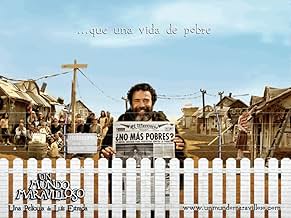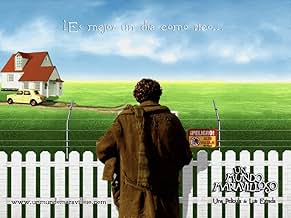AVALIAÇÃO DA IMDb
6,8/10
1,7 mil
SUA AVALIAÇÃO
Adicionar um enredo no seu idiomaThe minister of Economy gives a house, a car and job to a man who tried to jump from a building because of his poverty; soon, every poor tries the same strategy.The minister of Economy gives a house, a car and job to a man who tried to jump from a building because of his poverty; soon, every poor tries the same strategy.The minister of Economy gives a house, a car and job to a man who tried to jump from a building because of his poverty; soon, every poor tries the same strategy.
- Direção
- Roteiristas
- Artistas
- Prêmios
- 11 vitórias e 3 indicações no total
Pedro Armendáriz Jr.
- Director de 'El Mercurio'
- (as Pedro Armendáriz)
- Direção
- Roteiristas
- Elenco e equipe completos
- Produção, bilheteria e muito mais no IMDbPro
Avaliações em destaque
With regard to the comment entitled "Political propaganda by leftist artists" I'd like to point some things out. I saw this movie when it came out a few months ago in Mexico, where I had been studying all year. Like one of Estrada's first movies (La ley de Herodes), this one is also a severe political critique that attacks both the former PRI government (supposedly left wing) and the current PAN government (supposedly right wing). I think it should be noted, however, that while Fox's victory 6 years ago marked a BIG step towards political progress for Mexico, overall Mexicans are disappointed in the administration and the lack of significant changes that followed Fox's entrance into the office (not all entirely his fault, of course, given the left over PRI population that still has power in the government). And even though the PAN politicians might have cleaner hands than former PRI politicians, I don't think that the majority of the people in Mexico really distinguish between them that way. That is to say, I really think they just assume that all politicians, regardless of their party, are stealing money. Everyone I talked to while I was down there said they didn't have the slightest idea who they were going to vote for because all of the candidates were unappealing and untrustworthy, and it was all going to come down to the question, "Who's the lesser evil?"
So this leftist propaganda seems unlikely to me since López Obrador would be included in that category; even more so since he was originally a member of the PRI, and the PRD (his current party) is really just considered PRI #2, composed of unhappy PRI members who weren't being chosen for the positions they wanted. So, to sum all that up, the movie is critiquing Mexican politics in general and no party or politician is free from scrutiny here.
And finally, it's worth a rental if for no other reason than Damian Alcazar is absolutely wonderful!
So this leftist propaganda seems unlikely to me since López Obrador would be included in that category; even more so since he was originally a member of the PRI, and the PRD (his current party) is really just considered PRI #2, composed of unhappy PRI members who weren't being chosen for the positions they wanted. So, to sum all that up, the movie is critiquing Mexican politics in general and no party or politician is free from scrutiny here.
And finally, it's worth a rental if for no other reason than Damian Alcazar is absolutely wonderful!
This movie was both funny and sad at the time. Leave it Demián Bichir to play a both goofy and sympathetic protagonist trying to make it in this cold world. Check it out for yourself.
Not bad, but you get a feeling of a missed opportunity. Essentially it is nowhere as good as La Dictadura Perfecta or La Ley de Herodes. The movie just drags on for too long while one of the key subjects, the Panglossian views of the. Minister are hardly explored. Towards the end of the movie we learn a bit by accident that 60 million Mexicans live in abject poverty. The Porfirio Diaz connexion is just mildly suggested, Had Luis Estrada shortened the tramp scenes and developed more the economic "Casi el Paraiso" (after Spota's comic novel), we would have had a stronger story. In any case it is entertaining, and definitely not two hours wasted!
A WONDERFUL WORLD (dir. Luis Estrada) A savage political satire that rashly promotes class warfare and advocates the violent redistribution of wealth within the context of an extremely bitter fairytale. A homeless man is trapped on a windowsill at the Mexican World Financial Center building, and although it appears to be a suicide attempt, it's not. The CEO of the WFC offers a bribe to get him to publicly acknowledge that draconian anti-poverty measures played no part in his decision to end it all. And, through a surreal turn of events, this leads the Mexican federal government to declare 'War On The Poor' rather than to continue the pointless and unwinnable 'War On Poverty'. The film is a bold and impetuous attack on fascist global policies, a complacent and corrupt Fourth Estate, and the 'filthy rich' (AKA 'job creators'). Kick Out The Jams Brothers And Sisters!!!
No doubt about it, Estrada depicts some Mexico's political and social facts, however I find Herod's Law and A Wonderful World very similar.
I think Luis Estrada directs both movies following the same recipe.
Marginal class appear in both movies pretty good depicted; Mexican politicians as well; then come ridiculous circumstances that surround that lead both, politicians and poor people, beyond they ever dreamed: the politicians is rewarded for his criminal acts while the poor is dragged to his fate.
On Herod's Law the corrupt politician is rewarded becoming a Senator; on a Wonderful World the minister is awarded with Nobel Prize for starving the people. On the first movie the poor has to kill to get whatsoever he deserves (some respect and dignity) on the second movie this marginal family has to kill another family to get one single day of good life.
Herod's Law and A Wonderful World are pretty similar.
I think Luis Estrada directs both movies following the same recipe.
Marginal class appear in both movies pretty good depicted; Mexican politicians as well; then come ridiculous circumstances that surround that lead both, politicians and poor people, beyond they ever dreamed: the politicians is rewarded for his criminal acts while the poor is dragged to his fate.
On Herod's Law the corrupt politician is rewarded becoming a Senator; on a Wonderful World the minister is awarded with Nobel Prize for starving the people. On the first movie the poor has to kill to get whatsoever he deserves (some respect and dignity) on the second movie this marginal family has to kill another family to get one single day of good life.
Herod's Law and A Wonderful World are pretty similar.
Você sabia?
- CuriosidadesCharacter Pedro Lazcurain is named after a Mexican president who lasted only one day in the job.
- Erros de gravaçãoThe portrait that appears in the house of the politician Lascuraian, the Secretary of Economy of México, is, in fact, the portrait of Porfirio Díaz, president of México (1877-1911), and not from José Ives Limantour, Secretary of Economy of México in Diaz administration
- Trilhas sonorasWhat a Wonderful World
Written by George David Weiss and Bob Thiele
Performed by Louis Armstrong
Courtesy of Universal Music México
Principais escolhas
Faça login para avaliar e ver a lista de recomendações personalizadas
- How long is Un mundo maravilloso?Fornecido pela Alexa
Detalhes
- Data de lançamento
- País de origem
- Central de atendimento oficial
- Idioma
- Também conhecido como
- A Wonderful World
- Locações de filme
- Metepec, México(location)
- Empresas de produção
- Consulte mais créditos da empresa na IMDbPro
- Tempo de duração
- 1 h 58 min(118 min)
- Cor
- Mixagem de som
- Proporção
- 1.85 : 1
Contribua para esta página
Sugerir uma alteração ou adicionar conteúdo ausente























